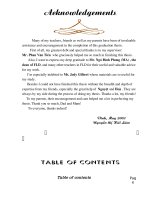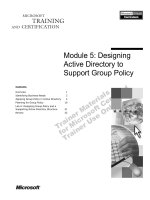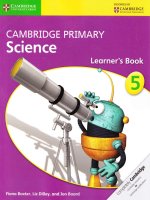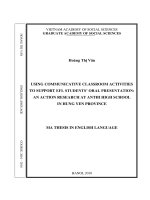Cambridge primary stage 5 worksheets activities to support y
Bạn đang xem bản rút gọn của tài liệu. Xem và tải ngay bản đầy đủ của tài liệu tại đây (3.58 MB, 48 trang )
Cambridge Primary
Stage 5
Activities to support you at home
Photocopiable activities
Unit 1
Photocopiable activity 1: This is me!
Use Wh- words to complete the questions.
Then answer the questions about Evie.
Hi! My name’s Evie. I’m 12 years old and I’m from
Liverpool. I live in the suburbs with my family. We
don’t live near the city centre so there isn’t much to
do, but we live in a house with a nice garden and
that’s great because we can have pets. I have a dog
called Night – he’s a black collie. We live near school
so we don’t get up too early. We go walking and we
meet our friends on the way. It’s fun. On Saturdays,
I attend Drama School with Ryan. I love acting and
reading theatre plays. Ryan is my best friend. When
we finish school we are going to start taking classes
at the Liverpool School of Performing Arts.
1
is her name?
2
is she from?
3
does she live?
4
her pet’s name?
5
is it?
6
does she go to school?
7
is her best friend?
8
do they like doing?
9
is she planning to go when she finishes school?
Now write about you. Include a photo or draw a picture.
146
Cambridge Global English Stage 5 Teacher’s Resource © Cambridge University Press 2016
Unit 1
Photocopiable activity 2: This is my friend Ryan!
Underline the correct adjective to complete
the sentences. Then talk about what is true
for you. Write a few sentences about you in
your notebook.
Ryan is interested / interesting in drama.
He wants to be an actor. He thinks football
is excited / exciting. He supports Liverpool FC
and he sometimes goes to Anfield when they
play at home. He never watches TV. He finds
TV programmes really bored / boring. He
prefers reading or watching films on DVD.
Ryan thinks that the weather in Liverpool isn’t
very good. He feels depressed / depressing
when it rains. He prefers hot and sunny weather.
Ryan says: ‘I’m not frightened / frightening
of insects or animals except bats. I find bats
extremely disgusted / disgusting.’
Now write about a friend. Use the text about Ryan as a model.
Add a photo of your friend or draw a picture.
Cambridge Global English Stage 5 Teacher’s Resource © Cambridge University Press 2016
147
Unit 2
Photocopiable activity 3: Wordsearch
Find the words and phrases for illnesses and symptoms. Write them in your
notebook.
S
O
R
E
T
H
R
O
A
T
T
C
L
O
A
F
U
E
S
U
O
O
V
I
S
E
N
Y
H
M
M
L
O
C
C
E
N
E
I
M
A
D
I
Z
Y
L
Y
A
V
Y
C
F
T
N
X
V
C
C
E
H
H
E
C
O
I
S
O
F
R
U
A
E
H
S
L
S
U
E
I
R
C
Y
Y
E
L
I
G
V
N
T
H
E
A
D
A
C
H
E
G
S
E
S
W
E
A
K
S
R
S
A
Now make a wordsearch for your friend.
148
Cambridge Global English Stage 5 Teacher’s Resource © Cambridge University Press 2016
Unit 2
Photocopiable activity 4: A healthy lunch
Look and match the foods to the correct food group. Then write a healthy
lunch menu. Compare it with a partner. Are they similar?
a
d
b
e
f
c
My menu
Cambridge Global English Stage 5 Teacher’s Resource © Cambridge University Press 2016
149
Unit 3
Photocopiable activity 5: Three cities
Compare the information and write sentences using the comparative and
superlative forms of the adjectives.
1 Look at the number of people who live in these places and write about
the places using crowded, noisy and peaceful in your notebook.
Kuala Lumpur 1,630,000
Taipei 2,620,000
Glastonbury 8,800
2 Apparently, Glastonbury is 6,000 years old. Kuala Lumpur is around 210
years old. Write about Kuala Lumpur using modern and spectacular.
3 Think about cities and places in your country and write about them in your
notebook. Use beautiful, clean, popular, pretty and noisy.
Compare your sentences with your partner. How similar or different are your
opinions? Make a few notes in your notebook.
What do you know about Kuala Lumpur, Taipei and Glastonbury? Search the
Internet and find out more information about them. Then make a fact file.
Name of city:
Country:
Population:
Language:
Attractions:
Two adjectives to describe the city:
Look for pictures to go with your fact files.
150
Cambridge Global English Stage 5 Teacher’s Resource © Cambridge University Press 2016
Unit 4
Photocopiable activity 8: Wordsearch – opposites
Read the clues and find the words. Find the opposite of:
anxious
clever
moody
hard-working
rude
weak
miserable
dry-eyed
C
I
J
T
A
I
H
T
O
U
G
H
E
C
L
E
P
S
E
A
L
W
O
T
R
L
Y
E
L
U
F
M
B
E
I
P
U
A
O
P
T
I
L
A
Z
Y
E
D
Make a wordsearch for the class. Use words you have learned in this unit.
Cambridge Global English Stage 5 Teacher’s Resource © Cambridge University Press 2016
153
Unit 5
Photocopiable activity 9: What do you think?
Complete these sentences using must, can’t, might or could.
1 I don’t know where Sammy lives but he
because he comes to school on foot.
live near here
2 Did you hear that noise? I think there
Call the police!
3 It
I think it
be a thief downstairs.
be a thief. All the doors and windows are locked.
be the cat.
4 Look! There’s ice on the grass. It
be really cold outside.
5 Dad has to go to the office and it’s Saturday! He
happy about that.
be very
What do you think about these people? Use must, can’t, might or could
and the words in the box to write sentences.
president teacher doctor vet doctor writer
musician tennis player swimmer
1
2
3
4
154
Cambridge Global English Stage 5 Teacher’s Resource © Cambridge University Press 2016
Unit 5
Photocopiable activity 10: Special superstars
Match the headings to correct paragraphs of the biography of Lionel ‘Leo’
Messi. Underline the words or phrases that helped you decide.
Quick facts
Humanitarian work
Career
Personal life
1 Lionel Andrés ‘Leo’ Messi is an Argentine footballer.
He was born in the city of Rosario in 1987. He plays as a forward for FC
Barcelona and the Argentina national team. He is also the captain of his
country’s national football team.
2 At the age of five, Messi started playing football for a local club coached
by his father. At the age of 11, Messi was diagnosed with an illness.
Because of this illness, he was much shorter than other children of his
age. FC Barcelona wanted him to play in the junior divisions of the club
because they knew he was very good. They offered to pay for Messi’s
medical treatment, if he went to Spain. Messi and his father moved to
Barcelona. In 2004, when he was 17 years old, he played his first match
with the first division team of the club. He has won four Balon d’Or, FIFA
World Player Awards and many others.
3 In 2007, Messi established the Leo Messi Foundation, a charity
supporting access to education and health care for vulnerable children.
He is also a goodwill ambassador for UNICEF, supporting children’s
rights. He has also donated a lot of money to the children’s hospital of his
hometown, Rosario.
4 In November 2012, his first son was born. His name is Thiago.
What is your opinion of Leo Messi? Write a few sentences saying what you
think about him. Remember to use adjectives to make your description more
interesting and modals to show how sure you are of what you say.
Cambridge Global English Stage 5 Teacher’s Resource © Cambridge University Press 2016
155
Unit 6
Photocopiable activity 11: Storytime
Write a story beginning: One evening, I was walking down the street when …
1 Make notes and plan your story. Use correct tenses – the past simple
and the past continuous.
How many characters are there?
Adjectives that describe the characters:
Setting:
Problem:
What happens in order to resolve the problem:
Resolution:
2 Now organise your story. Think about what happens first, what next.
My Story
What happens first
What happens next
What happens after
How it ends
3 Use correct punctuation.
4 Write your story.
5 Give your story to a partner to read.
6 Read your partner’s story. Think about these questions: Are the characters
well described? Is the story exciting? Is the resolution interesting? Would you
recommend the story to a friend?
7 Illustrate your story.
156
Cambridge Global English Stage 5 Teacher’s Resource © Cambridge University Press 2016
Unit 6
Photocopiable activity 12: It’s punctuation time!
Read the sentences and put in the correct punctuation.
Then read the sentences aloud with the correct intonation.
1 What is your name asked the teacher
2 Paul said you must be Dave’s sister hello
3 Jill asked is lunch ready mum
4 I am so hungry said Paul I could eat a horse
5 Do you know where the post office is the lady asked the policeman
6 The teacher asked has anyone seen Dianne and Yasmine
Now write three more sentences. Don’t use any punctuation.
Exchange your sentences with a partner and punctuate them correctly.
Cambridge Global English Stage 5 Teacher’s Resource © Cambridge University Press 2016
157
Unit 7
Photocopiable activity 13: The Parthenon
Read about The Parthenon and put the verbs in brackets into the past passive.
The Parthenon is a temple in Athens, Greece. It
(build) by Pericles.
The construction of The Parthenon began in 447 BCE and it
(complete) in 438 BCE. It
(considered) one of the most important
buildings of ancient Greece.
It had many statues. These statues
metopes
still there or they
The Parthenon
(destroy) or
(call) metopes. Many of the
(damage). Some others are
(take) different museums around the world.
(use) for different religions. First, it
(dedicated) to the goddess Athena. In the 5th century CE, it
(convert) into a Christian church and in the early 1460s it
into a mosque.
(turn)
Look for information about another famous monument and write a description
in your notebook. Use the description of The Parthenon as a model.
158
Cambridge Global English Stage 5 Teacher’s Resource © Cambridge University Press 2016
Unit 8
Photocopiable activity 15: Who wants to be a rainforest expert?
Search the Internet and find the answers to the rainforest quiz.
1 What is the country with the second largest amount of rainforests?
Mark it on the map.
2 Why are there a lot of plants and animals in a rainforest?
3 Lemurs are found in only one place. Where?
4 What is an okapi?
5 Why are jaguars endangered?
6 Rainforests absorb carbon dioxide. True or false?
7 Name three things that can help save rainforests.
8 What can we do at home to protect the environment?
Write two more questions for a class quiz.
160
Cambridge Global English Stage 5 Teacher’s Resource © Cambridge University Press 2016
Unit 9
Photocopiable activity 17: Caring for cats
Put the words in order to make sentences about looking after a cat.
1 food / too / cat / You / your / give / much / mustn’t
2 three / Kittens / times / day / eat / should / a
3 water / cat / have / must / a / Your / always / bowl / fresh / of
4 water / to / You / day / have / bowl / every / clean / the
5 cat / You / your / parents / need / the / ask / help / bathe / to / to / you
Have you got a cat? Do you do these things?
Write some more things about looking after cats.
It’s best to
.
It’s a good idea to
.
It’s important to
.
162
Cambridge Global English Stage 5 Teacher’s Resource © Cambridge University Press 2016
Cambridge Primary English Stage 5 Teach
her’s Resourcee
© Cambridgee University Preess 2018
PCM
M2
Title
Author
Here are some sentence starters:
I liked it when …
An interesting thing I found out was …
I hope …
My favourite character …
Date
Did not enjoy
Date:
I didn’t like it when …
I predict …
My favourite part …
Genre (What is it?)
Recording everything you read (fiction and non-fiction) is a great way to
remind yourself of what you know
know, like and want to do
do. Keep your
reading log handy at all times and don’t forget the enjoyometer!
Name:
PCM 2 Reading log
My comment
Enjoyed a lot
PCM 13 Plan and write a biography
Name:
Date:
A biography of
(name)
Dates:
Picture
Early life
Major events
Achievements
I would describe this person as:
This person’s impact on society and in history:
From this person I have learned:
Cambridge Primary English Stage 5 Teacher’s Resource
© Cambridge University Press 2018
PCM 13
PCM 16 Plan and write a haiku poem
Name:
Date:
1 Think up some ideas for a haiku about something in nature. Write down your ideas.
a large wave
a seed
a tree
the sun
2 Choose a topic you ‘connect’ with – something that brings back a memory or reminds
you of something.
3 Describe your topic literally and figuratively.
Haiku topic:
Literal description (think of your senses –
adjectives, verbs and adverbs)
Penguins have black and
white feathers.
Figurative description (similes and
metaphors)
Penguins are emperors in
smart outfits.
Tip: Use a thesaurus to find synonyms for words you have used to describe your topic.
4 Write a first draft. Edit and improve your work and then write it out neatly.
Tip: Make the first part literal; the second part figurative.
First draft
Final work
(5 syllables)
(7 syllables)
(5 syllables)
Tip: Is the last line a contrast or surprise?
Cambridge Primary English Stage 5 Teacher’s Resource
© Cambridge University Press 2018
PCM 16
PCM 18 Direct and reported speech
Name:
Date:
Complete these two versions of a myth by putting the reported speech into direct speech
and the direct speech into reported speech.
Tip: Remember to change the pronouns!
The origins of the volcano Mount Etna
Reported speech
Tip: Remember to use the past tense!
Zeus said that when he was younger he had
to battle the Titan monster Typhon.
Direct speech
Tip: Remember the speech marks!
Zeus said, “When I …
He also told us that he was shocked when
he first saw Typhon because he had a
hundred heads oozing with venom and
slime.
He also said, “I was …
Zeus admitted that he …
“Typhon is a ghastly sight and my fellow
gods are so terrified that some of them
have turned themselves into animals to
hide,” Zeus admitted.
Zeus also said that …
Zeus continued, “When Typhon lifted the
mountain to hurl it at us, I let loose one of
my thunderbolts, which sent the
mountain crashing down on top of him.”
Zeus …
“He is trapped there to this day,” Zeus
boasted. “If you don’t believe me, go to
Sicily and see how Mount Etna spews
out smoke, flames and boiling rock
whenever Typhon wakes and rages at his
captivity.”
Cambridge Primary English Stage 5 Teacher’s Resource
© Cambridge University Press 2018
PCM 18
PCM 19 Who is a hero?
Name:
Date:
hero n. 1. someone who does something brave or good which people respect or admire
them for. 2. the main male character in a book or film, who is usually good.
Hero:
Qualities:
Hero:
Qualities:
Hero:
Qualities:
Hero:
Qualities:
Hero:
Qualities:
Cambridge Primary English Stage 5 Teacher’s Resource
© Cambridge University Press 2018
Hero:
Qualities:
Hero:
Qualities:
Hero:
Qualities:
PCM 19
PCM 24 Practise poetic techniques
Name:
Date:
Practice makes perfect and you need to
practise your poetic technique!
Check your knowledge.
1 What is a simile?
Example:
2 What is a metaphor?
Example:
3 What is personification?
Example:
4 Use figurative language to transform these ordinary objects with your imaginative
descriptions:
Simile:
Metaphor:
Personification:
Simile:
Metaphor:
Personification:
Simile:
Metaphor:
Personification:
Cambridge Primary English Stage 5 Teacher’s Resource
© Cambridge University Press 2018
PCM 24
PCM 30 Oral review
Name:
Date:
Use this clapperboard to prepare your oral review. Write down key words only and use them
as a prompt when you are speaking.
Tips:
• Speak clearly and use expression.
• Keep eye contact with your audience – don’t just read your speech.
• Prepare well and be confident.
• Be enthusiastic!
Film title
Genre
Main characters including
my favourite character
Time
Age
Directed by:
Written by:
Setting and plot
My favourite scene
Special effects
Other
Cambridge Primary English Stage 5 Teacher’s Resource
© Cambridge University Press 2018
Rating
PCM 30
PCM 31 Write a letter
Name:
Date:
Use this template to write your letter.
Read through the instructions and go through the criteria before you begin.
Address and date on
the right side
For the greeting,
ensure the name is
correct or use Sir or
Madam.
Introduce yourself.
State the purpose of
your letter.
Dear
Give further
information. State
your point-of- view.
Express your pointof -view.
Conclude with a
clear statement to
sum up the points in
the letter.
Sign off. If you
address a letter to
Sir or Madam, sign
off with
Yours faithfully.
Cambridge Primary English Stage 5 Teacher’s Resource
© Cambridge University Press 2018
Yours sincerely
PCM 31
PCM 34 Plan a dialogue
Name:
Date:
• Use direct speech – no need for quotation marks.
• Write in the first person, using first person pronouns (I, my, mine, we, us, ours).
• The language should suit the character. Colloquial language is acceptable.
Character’s name
:
Character’s name
:
Character’s name
:
Character’s name
:
Character’s name
:
Character’s name
:
Character’s name
:
Character’s name
:
Character’s name
:
Character’s name
:
Cambridge Primary English Stage 5 Teacher’s Resource
© Cambridge University Press 2018
PCM 34
PCM 35 Write a script
Name:
The title of the
play tells the
reader what the
play is called
and may give
some clues as to
what the play is
about.
Date:
Title:
Act:
Cast
The cast list tells
the reader who
the characters
are and how
many there are.
The scene
describes the
setting. Some
acts have more
than one scene.
An act is a main
part of a play.
A play can have
one or more
acts. Each act
can have one or
more scenes.
Stage props
The stage props, or
properties, are the extra
things on the stage like
the backdrop, costumes,
equipment, etc.
Scene
The stage directions tell the
actor how to behave and what
expressions to use.
Characters’
names are
written down
the left-hand
side of the page.
Dialogue helps
to tell the story
and develop the
characters.
Cambridge Primary English Stage 5 Teacher’s Resource
© Cambridge University Press 2018
PCM 35
Sequence cards
What to do:
· Cut out the cards.
· Four of the cards are clues that tell you about a number sequence.
· Use the clues to help you sort the cards into four sets: A, B, C and D. There are three cards in each set.
· What are the rules for sequences A, B, C and D?
−25, 0, 25, . . .
−15, −10, −5, . . .
30, 28, 26, 24, . . .
is part of sequence A
0, 5, 10, . . .
is part of sequence B
14, 12, 10, . . .
12, 15, 18, . . .
0, 3, 6, 9, . . .
is part of sequence C
−100, −95, −90, −85, . . .
75, 100, 125, 150, . . .
is part of sequence D
875, 900, 925, . . .
21, 24, 27, 30, . . .
22, 20, 18, 16, . . .
Original Material © Cambridge University Press, 2014
Chapter 1 Sequence cards









